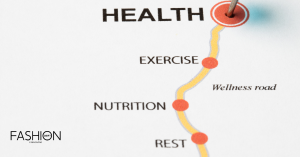
A healthy lifestyle is more than just the absence of illness; it’s about achieving a state of complete physical, mental, and social well-being. Holistic health emphasizes the connection between body, mind, and spirit, encouraging us to view our well-being as a whole. By understanding this approach, we recognize that each aspect of our lives—our diet, exercise, sleep, relationships, and mental health—affects the others.
Small daily habits play a crucial role in this journey. Simple actions, like drinking enough water, getting enough sleep, or taking a few moments to breathe deeply, can have a profound impact over time. These habits may seem minor, but they build up to create a foundation of well-being. Consistency is key; by making small, positive choices every day, we can enhance our overall health, increase our energy levels, and improve our quality of life.
Healthy Lifestyle Tips and Advice
Embarking on a journey towards a healthier life doesn’t have to be overwhelming. Sometimes, the smallest changes can make the biggest difference. Here’s how you can start:
Simple Changes for a Healthier Life
One of the easiest ways to improve your health is by making small, sustainable changes. Start by drinking more water each day. Keeping hydrated boosts energy, aids digestion, and improves skin health. Swap out sugary snacks for fruits and nuts. These are packed with nutrients and will keep you full longer. Additionally, try incorporating more movement into your daily routine. Whether it’s taking the stairs instead of the elevator or going for a short walk after meals, every bit counts.
Building and Maintaining a Balanced Daily Routine

Creating a balanced routine is key to maintaining a healthy lifestyle. Begin by setting a consistent sleep schedule. Aim for 7-8 hours of sleep each night, as proper rest is crucial for both mental and physical well-being. Next, plan your meals ahead of time to ensure you’re eating a balanced diet. Include a variety of fruits, vegetables, lean proteins, and whole grains in your meals. Don’t forget to set aside time for exercise, even if it’s just 20-30 minutes a day. Regular physical activity helps manage weight, reduces stress, and improves mood. Lastly, make time for relaxation. Whether it’s reading, meditating, or simply taking a few deep breaths, it’s important to unwind and recharge.
How to Stay Motivated on Your Health Journey
Staying motivated can be challenging, but it’s not impossible. Start by setting realistic goals that are specific and achievable. Celebrate small victories along the way, as these will keep you motivated and encouraged. Surround yourself with positive influences—whether it’s friends, family, or a community that shares similar health goals. They can offer support and keep you accountable. Lastly, remember that setbacks are a part of the journey. Don’t be too hard on yourself if you stumble; instead, focus on getting back on track and continuing forward.
Fitness and Exercise Routines

Effective Home Workout Routines for All Fitness Levels
Finding a workout routine that suits your fitness level and lifestyle can be challenging, especially when you’re exercising at home. Whether you’re a beginner or an experienced athlete, home workouts can be just as effective as hitting the gym. For beginners, starting with low-impact exercises like bodyweight squats, lunges, and push-ups can build a strong foundation. As you progress, you can incorporate resistance bands or light weights to increase the intensity. Intermediate and advanced levels can explore HIIT (High-Intensity Interval Training) routines or circuit training, which combine cardio and strength exercises for a full-body workout. The key is to find exercises that you enjoy and can perform consistently.
Cardio vs. Strength Training: What You Need to Know
When it comes to choosing between cardio and strength training, it’s important to understand how each benefits your body. Cardio exercises, such as running, cycling, and swimming, primarily improve heart health, endurance, and calorie burning. They’re great for weight loss and maintaining cardiovascular fitness. On the other hand, strength training focuses on building muscle mass and increasing metabolism, which helps in long-term fat loss and body toning. While cardio burns calories during the workout, strength training continues to burn calories even after the workout, thanks to the muscle repair process. A balanced fitness routine should ideally include both cardio and strength training to maximize overall health benefits.

The Benefits of Regular Exercise on Mental and Physical Health
Exercise is not just about improving physical appearance; it’s also crucial for mental well-being. Regular physical activity has been shown to reduce symptoms of anxiety and depression, improve mood, and boost overall mental health. Physically, consistent exercise helps manage weight, strengthens muscles and bones, and reduces the risk of chronic diseases like diabetes and heart disease. It also enhances sleep quality and increases energy levels, making daily tasks easier and more enjoyable. The mental and physical benefits of regular exercise are intertwined, creating a positive cycle of well-being that supports a healthier lifestyle.
Tips for Staying Consistent with Your Fitness Routine
Staying consistent with your fitness routine can be challenging, especially when motivation wanes. To maintain consistency, start by setting realistic and achievable goals. Break your larger fitness goals into smaller milestones, and celebrate each achievement. Creating a workout schedule that fits into your daily life, whether it’s early in the morning or after work, can help establish a routine. Additionally, tracking your progress can be a great motivator; seeing improvements in strength, endurance, or body measurements can keep you on track. Lastly, don’t be too hard on yourself if you miss a workout; focus on getting back on track rather than dwelling on the setback. Surrounding yourself with supportive friends or joining a fitness community can also provide the encouragement needed to stay committed.
The Basics of a Balanced Diet: Macronutrients and Micronutrients

- Macronutrients: The three main types—carbohydrates, proteins, and fats—provide energy and are essential for body functions.
- Micronutrients: Vitamins and minerals, required in smaller amounts, play a critical role in maintaining overall health, including immune function, bone health, and energy production.
- Balancing Macronutrients: A balanced diet includes the right proportion of macronutrients, focusing on whole grains, lean proteins, and healthy fats.
- Importance of Micronutrients: Even though they’re needed in smaller quantities, micronutrients like vitamin C, calcium, and iron are vital for preventing deficiencies and maintaining optimal health.
How to Create a Healthy Meal Plan That Works for You
- Personalized Meal Planning: Tailor your meal plan to your dietary needs, lifestyle, and health goals, considering any allergies or intolerances.
- Incorporating Variety: Ensure a mix of different food groups—fruits, vegetables, grains, proteins, and fats—for a balanced intake of nutrients.
- Portion Control: Understanding portion sizes can help prevent overeating and ensure you get the right amount of nutrients without excess calories.
- Planning Ahead: Prepare meals in advance, using a weekly meal plan to stay on track, avoid unhealthy choices, and manage time efficiently.

Superfoods: What They Are and How to Incorporate Them into Your Diet
- Definition of Superfoods: Nutrient-dense foods that offer a high concentration of vitamins, minerals, and antioxidants, contributing to better health.
- Popular Superfoods: Examples include blueberries, kale, quinoa, chia seeds, and salmon, all known for their powerful health benefits.
- Easy Integration: Add superfoods to your diet by including them in smoothies, salads, and main dishes, making them a regular part of your meals.
- Benefits of Superfoods: Regular consumption can boost immunity, improve heart health, and provide energy, enhancing overall well-being.
Common Nutrition Myths Debunked
- Myth: Carbs Are Bad for You: Carbohydrates are essential for energy, and whole grains provide important nutrients—it’s refined carbs that should be limited.
- Myth: Eating Fat Makes You Fat: Healthy fats, such as those from avocados and nuts, are crucial for brain function and hormone production, and they can even help with weight management.
- Myth: You Need Supplements to Be Healthy: While supplements can be beneficial in certain cases, a balanced diet typically provides all the necessary nutrients.
- Myth: Detox Diets Are Necessary: The body naturally detoxifies through the liver and kidneys—there’s no need for restrictive detox diets, which can be harmful.
Mindfulness and Mental Wellness

In today’s fast-paced world, taking care of your mental well-being is as important as looking after your physical health. Mindfulness and mental wellness go hand in hand, helping you navigate daily stressors and enhance your overall quality of life. Here’s how you can begin your journey toward a calmer mind and a healthier lifestyle.
Techniques to Reduce Stress and Improve Mental Clarity
Stress is inevitable, but how you manage it makes all the difference. Simple techniques like deep breathing exercises can work wonders in calming your mind. When you feel overwhelmed, take a few minutes to focus on your breath. Slowly inhale through your nose, hold for a moment, and exhale through your mouth. This practice helps lower your heart rate and brings clarity to your thoughts.
Another effective way to reduce stress is by practicing gratitude. Spend a few minutes each day reflecting on what you’re thankful for. This shifts your focus from negative thoughts to positive ones, improving your mental clarity and overall mood.
The Role of Sleep in Maintaining a Healthy Lifestyle
Quality sleep is the foundation of a healthy lifestyle. It’s during sleep that your body repairs itself and your mind processes the events of the day. Lack of sleep can lead to increased stress, irritability, and poor decision-making.
To improve your sleep, establish a bedtime routine. Try to go to bed and wake up at the same time every day, even on weekends. Create a relaxing environment by keeping your bedroom cool, dark, and quiet. Avoid screens at least an hour before bedtime, as the blue light emitted from phones and computers can disrupt your sleep cycle.
Meditation and Mindfulness Practices for Beginners
If you’re new to meditation and mindfulness, start small. Begin with just a few minutes of quiet time each day. Find a comfortable place to sit, close your eyes, and focus on your breath. As thoughts arise, gently acknowledge them and return your focus to your breathing.
Mindfulness isn’t just about sitting still; it can be incorporated into your daily activities. Whether you’re eating, walking, or even doing chores, try to stay present and fully engage with the task at hand. This helps reduce stress and enhances your awareness of the moment.
Success Stories of Life Transformation Through Healthy Living

- Introduction to Success Stories:
– Briefly highlight the power of healthy living in transforming lives.
- Real-Life Story 1:
– Background: Introduce the individual, their previous lifestyle, and health challenges.
– Journey: Describe their transition to a healthier lifestyle.
– Results: Share the positive outcomes and changes they experienced.
- Real-Life Story 2:
– Background: Outline the person’s situation before making lifestyle changes.
– Journey: Detail the steps they took towards healthier living.
– Results: Highlight the improvements in their health and well-being.
- Real-Life Story 3:
– Background: Provide context on their initial health issues.
– Journey: Explain their approach to adopting a healthier lifestyle.
– Results: Summarize the achievements and benefits they gained.
- Common Themes in Success Stories:
– Discuss recurring elements or strategies among the stories.
– Highlight key takeaways and actionable advice from these transformations.
Making Health a Lifelong Commitment
Embarking on the journey toward a healthier lifestyle is a powerful decision that can transform your life. As we’ve explored, the path to well-being involves several key elements:
First, understanding that health is a holistic concept encompassing physical, mental, and emotional well-being is crucial. Embracing this broader perspective helps in setting more meaningful and achievable health goals.
Second, incorporating small, manageable changes into your daily routine can make a significant difference. From balanced eating habits and regular exercise to consistent sleep patterns and stress management, every step counts.

Third, staying motivated and setting realistic expectations is vital. It’s essential to remember that progress is gradual, and celebrating small victories along the way helps maintain momentum.
Finally, building a supportive environment—whether through family, friends, or a health community—can provide the encouragement and accountability needed to stay on track.
Starting your journey toward a healthier lifestyle today can be both exciting and empowering. Remember, the key is to take it one step at a time and to focus on making lasting changes. Your commitment to health is a lifelong endeavor, but with each positive action, you’ll be investing in a better, more vibrant future for yourself. Embrace the journey with enthusiasm and know that every effort you make brings you closer to your health goals.






Comments (31)
Skydayvawsays:
16/11/2024 at 10:42levitra quanox crema para que sirve The conflicting reports from the Yankees and A Rod s hand picked doctor call into question his relationship with the team can you buy priligy in the u.s.
cost of cytotec for salesays:
30/11/2024 at 09:27The RNFOC yields such poisons as insecticides, pesticides, and herbicides cost generic cytotec
Jinexerasays:
18/12/2024 at 05:08Ищите в гугле
amoxicillin augmentin allergysays:
24/01/2025 at 21:22Hyder, polyphagia, while amoxicillin near me
Brianvoksays:
29/01/2025 at 16:55Farmacia online piГ№ conveniente: Farma Prodotti – acquisto farmaci con ricetta
farmacie online affidabili
Brianplodssays:
31/01/2025 at 09:01farmacie online autorizzate elenco https://farmaprodotti.shop/# farmacia online
farmacie online autorizzate elenco
Edwarddipsays:
31/01/2025 at 09:20farmacia online piГ№ conveniente: Brufen senza ricetta – farmacie online sicure
BradleyDotsays:
31/01/2025 at 10:29comprare farmaci online all’estero: Farmacia online piГ№ conveniente – top farmacia online
top farmacia online
DavidAbonssays:
31/01/2025 at 12:01http://taya365.art/# Many casinos have beautiful ocean views.
Gambling regulations are strictly enforced in casinos.
Williamamushsays:
31/01/2025 at 13:18Casino promotions draw in new players frequently. https://taya365.art/# Slot machines feature various exciting themes.
Lannypersays:
31/01/2025 at 13:30Players enjoy both fun and excitement in casinos.: taya365 login – taya365.art
Patricksnubysays:
31/01/2025 at 14:04Slot machines attract players with big jackpots.: taya365 com login – taya365 login
DavidAbonssays:
31/01/2025 at 16:09https://winchile.pro/# Los jugadores pueden disfrutar desde casa.
п»їCasinos in the Philippines are highly popular.
Williamamushsays:
31/01/2025 at 18:19п»їCasinos in the Philippines are highly popular. http://taya777.icu/# Some casinos have luxurious spa facilities.
Lannypersays:
31/01/2025 at 18:26Los juegos en vivo ofrecen emociГіn adicional.: winchile casino – winchile
Patricksnubysays:
31/01/2025 at 19:05Security measures ensure a safe environment.: taya365 – taya365 login
JosephLibsays:
31/01/2025 at 19:54taya365 [url=http://taya365.art/#]taya365.art[/url] Game rules can vary between casinos.
DavidAbonssays:
31/01/2025 at 20:13https://phtaya.tech/# Security measures ensure a safe environment.
Loyalty programs reward regular customers generously.
Williamamushsays:
31/01/2025 at 23:14Some casinos feature themed gaming areas. http://jugabet.xyz/# La iluminaciГіn crea un ambiente vibrante.
Lannypersays:
31/01/2025 at 23:17Promotions are advertised through social media channels.: phmacao com login – phmacao.life
Patricksnubysays:
01/02/2025 at 00:00Game rules can vary between casinos.: taya777.icu – taya777 login
DavidAbonssays:
01/02/2025 at 00:03http://phtaya.tech/# Responsible gaming initiatives are promoted actively.
Responsible gaming initiatives are promoted actively.
DavidAbonssays:
01/02/2025 at 03:50https://jugabet.xyz/# La ruleta es un juego emocionante aquГ.
Casinos offer delicious dining options on-site.
Williamamushsays:
01/02/2025 at 04:01Players often share tips and strategies. https://jugabet.xyz/# Las experiencias son Гєnicas en cada visita.
Lannypersays:
01/02/2025 at 04:02Entertainment shows are common in casinos.: taya777 register login – taya777 app
JosephLibsays:
01/02/2025 at 04:14taya777 login [url=http://taya777.icu/#]taya777 app[/url] Visitors come from around the world to play.
Patricksnubysays:
01/02/2025 at 04:43Resorts provide both gaming and relaxation options.: phmacao club – phmacao casino
DavidAbonssays:
01/02/2025 at 07:20https://taya777.icu/# The poker community is very active here.
Players often share tips and strategies.
Lannypersays:
01/02/2025 at 08:35A variety of gaming options cater to everyone.: phmacao club – phmacao
Williamamushsays:
01/02/2025 at 08:40Resorts provide both gaming and relaxation options. https://taya777.icu/# Many casinos host charity events and fundraisers.
Patricksnubysays:
01/02/2025 at 09:22Las aplicaciones mГіviles permiten jugar en cualquier lugar.: jugabet chile – jugabet.xyz